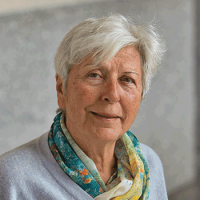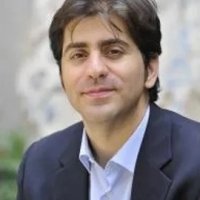The Iranian Nuclear Deal and the Impact on its Neighbors
Four experts discussed the potential nuclear deal between Iran and the P5+1 nations and how such a deal would affect its neighbors, particular those in the Gulf region.
On June 23, 2014 the Middle East Program of the Woodrow Wilson Center hosted a discussion, “The Iranian Nuclear Deal and the Impact on its Neighbors.” The discussion had two panels with Abdullah Baabood, Director of the Gulf Studies Program at Qatar University, and David Ottaway, Senior Scholar at the Wilson Center, speaking during the first panel moderated by the Haleh Esfandiari, Director of the Middle East Program at the Wilson Center. Bijan Khajehpour, Managing Partner at Atieh International, and Marina Ottaway, Senior Scholar at the Wilson Center, spoke during the second panel with Afshin Molavi, former Wilson Center public policy scholar and Senior Research Fellow at the New America Foundation, serving as moderator and commentator.
Baabood opened the discussion by examining the implications of the nuclear deal with Iran on the Arab states of the Persian Gulf. Baabood emphasized that while the Gulf countries have made strides toward increased cooperation through the Gulf Cooperation Council (GCC), they are still fundamentally six different states with six unique foreign policies and should not be lumped together. He noted the Iranian strategy of playing the Gulf states against one another by engaging some while ignoring others when it suits Iranian interests. On the interim Geneva nuclear deal with Iran, Baabood explained that it had presented a challenge to Gulf states for several reasons: namely, it largely excluded the GCC from playing any role except for Oman being a secret facilitator between Iran and the United States; was aimed only at the nuclear deal while the GCC has broader concerns with Iran; was poor timed; and contributed to the overall fear the GCC has that the United States intends to strike a grand bargain with Iran—wherein the U.S. relationship with Iran would gain normalcy at the expense of its relationship with the GCC.
David Ottaway focused on Saudi Arabia’s concerns with the Iranian nuclear deal. He delved into the history of Iranian-Saudi relations and noted that there has long been an intense rivalry. Ottaway mentioned that the United States has been pushing Saudi Arabia toward détente with Iran and that the Saudis themselves, seeing the prospects for a comprehensive nuclear deal, have reached out to Iran along with other GCC states because they do not want to be left behind if and when a deal is reached. Ottaway said Saudis hope, however, that hardliners in Tehran and Washington will scuttle any would-be deal and expressed skepticism that détente can occur between Iran and Saudi Arabia at the present time as their rivalry is seemingly peaking. He indicated that the Saudis currently view rapprochement with Iran as accepting Iranian gains in the region.
After brief introductory remarks by Molavi, Khajehpour started the second panel discussion by analyzing the economic aspects of a comprehensive nuclear deal with Iran in the region. He said the four areas of potential convergence or divergence from the deal in an economic sense are related to the energy sector, regional trade, cross-border investments, and foreign direct investment. The sanctions relief proposed by a comprehensive nuclear deal with Iran would be by and large beneficial to the whole region, he said. A kind of win-win situation would arise from the economic interconnectivity that would develop between Iran and its neighbors, as Iran can export much-needed gas and electricity. Iran could also become a thoroughfare for energy pipelines, Khajehpour said. While there will be increased competitive Iranian exports of petroleum products, Iran’s crude petroleum exports will not rise to levels that would threaten or harm competitors. Khajehpour also pointed out that the Iranian nuclear energy program is strategically beneficial and worthwhile because using nuclear energy to meet the country’s ever-increasing domestic energy needs would make available more oil and gas for export.
Marina Ottaway analyzed the current situation in Iraq and the effects that a possible comprehensive nuclear deal with Iran would have on the country. She emphasized that Iraq was on its way into breaking up into three different entities: a Kurdish North, a Shi’a-ruled South, and a Sunni West. Ottaway emphasized that while the United States is turning away from Iraqi Prime Minister Nouri al-Maliki, Iran supports him and is better situated in Iraq to get what it wants. She noted that with Maliki remaining in power, sectarian tensions will only be exacerbated, further fragmenting the country. With regard to the effect of a potential Iranian nuclear deal on this situation, Ottaway said this will have to be analyzed in terms of the varying reactions it will get from the different and increasingly more autonomous regions of Iraq. Iraqi Kurds have been historically close to Iran and will maintain good relations with or without a comprehensive nuclear agreement—the deadline for which is July 20. The same goes for the Shi’a, while the Sunni areas, currently dominated by the Islamic State in Iraq and Syria (ISIS), will remain hostile to Iran regardless of the outcome of the nuclear deal.
By Sina Toossi, Middle East Program
Speakers

Former Washington Post Middle East Correspondent

Former Senior Research Associate and Head of the Middle East Program, Carnegie Endowment for International Peace

Senior Fellow, Foreign Policy Institute, Johns Hopkins SAIS
Hosted By

Middle East Program
The Wilson Center’s Middle East Program serves as a crucial resource for the policymaking community and beyond, providing analyses and research that helps inform US foreign policymaking, stimulates public debate, and expands knowledge about issues in the wider Middle East and North Africa (MENA) region. Read more
